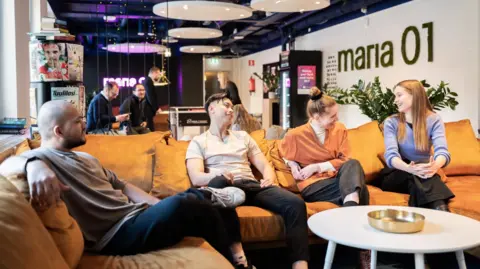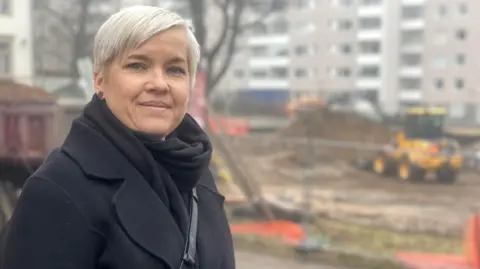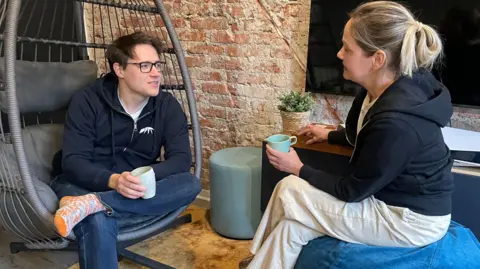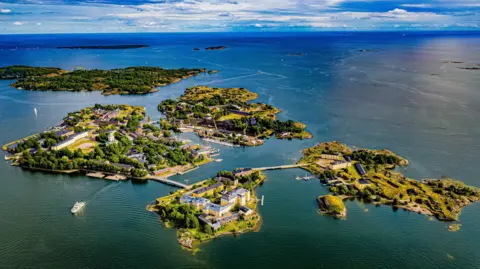BBC Information, Helsinki
 Maria 01
Maria 01Yellow diggers are shoring up mounds of earth, as building staff put together to put the foundations for what’s set to develop into the biggest start-up campus in Europe.
The mission is an enlargement of Maria 01, a co-working and occasion house for entrepreneurs and traders, in addition to bigger firms that wish to collaborate with tech start-ups.
Its current services throughout the road already home round 240 start-ups. They’re unfold throughout six buildings that used to make up town’s first hospital, based within the nineteenth Century and infamous in Helsinki for treating sufferers with the plague.
Now, the present 20,000 sq m website is a hub for corporations growing progressive well being applied sciences, alongside AI, cybersecurity, gaming and defence tech start-ups.
“The entire place is actually based mostly on neighborhood,” says Maria 01’s CEO Sarita Runeberg. “We convey individuals collectively to allow them to community… and discover completely different sorts of assets to develop their companies.”
There are additionally workplace perks together with a pool desk, desk soccer, working and ice bathing golf equipment, and in true Finnish-style, a sauna.
“We would not be a correct start-up hub if we did not have our personal sauna right here!” laughs Ms Runeberg.
 Maddy Savage
Maddy SavageWhereas co-working areas for tech corporations are properly established throughout the Nordics, Maria 01 is the biggest of its type within the area.
It’s run as a not-for-profit organisation partly funded by town of Helsinki, which has invested greater than €6m ($6.7m; £5.2m) within the hub since its launch in 2016.
Ms Runeberg believes it is going to develop into the most important start-up campus in Europe following the completion of three new buildings by 2028, including a 50,000 sqm flooring space.
Later this 12 months it’s launching an accelerator programme designed to help and information high-growth start-ups.
The hub’s present and former members have already collectively raised over €1bn in funding.
This represents round 40% of all early stage funding raised yearly by Finnish start-ups.
Ruben Byron is the Belgian co-founder of a start-up providing cloud providers to AI builders.
He has already scaled his enterprise from a handful of workers utilizing the hub’s scorching desks to a group of round 40 working from non-public workplaces within the former hospital, in addition to remotely.
“That has been an important expertise, that we have type of been ready [to] be nurtured right here in a means,” he says.
 Maddy Savage
Maddy SavageThough not as mature – or well-known globally – as different European start-up hubs like Sweden and the UK, Finland has been steadily making a reputation for itself within the tech scene during the last twenty years.
The small Nordic nation, which has a inhabitants of round 5.6 million, has spawned 12 unicorn companies – corporations price a billion {dollars} or extra – together with sleep and health monitoring ring Oura, recreation builders Supercell, Rovio (the creators of the Offended Birds recreation), and meals supply platform Wolt.
Final 12 months, Startup Blink, a worldwide index mapping greater than 100 nations ranked Finland’s start-up ecosystem the seventh greatest in western Europe, and 14th on the earth.
The index cites components together with hubs like Maria 01, alongside excessive ranges of state and college help, and Slush – an enormous annual non-profit gathering for world start-ups and traders.
It additionally highlights Finland’s clear and open enterprise tradition.
“There’s an authenticity with the Finns,” says Jack Parker, a Helsinki-based founder initially from Newcastle upon Tyne, who runs a healthcare innovation start-up.
“Ego does not actually play an element. So if I attain out to anyone, it is fairly possible eight out of 10 occasions that they’ll reply.”
 Maddy Savage
Maddy SavageFinland’s right-wing coalition, which got here into energy in 2023, is on a mission to push the nation even additional up world indices, stating in its official government programme that it needs the Nordic nation to develop into a frontrunner in fostering a dynamic start-up and progress firm ecosystem.
“It is not nearly rankings,” says Marjo Ilmari, who runs the start-up providers group at Enterprise Finland, the federal government company that promotes funding and innovation.
In 2024 Business Finland alone invested €112m in start-ups, a rise of 30% in comparison with the earlier 12 months.
“The actual aim is to create an surroundings the place our ground-breaking start-ups can emerge and actually deal with world challenges.”
The company hopes it will assist drive progress within the Finnish economic system, which went into recession in 2023 and is at present making a sluggish restoration, with the Bank of Finland forecasting a rise of lower than 1% this 12 months.
The nation can also be attempting to draw extra world expertise by providing start-up permits for worldwide founders who wish to develop their companies in Finland.
These entrepreneurs are eligible for a so-called soft-landing help bundle offered by Enterprise Finland.
“They provide you recommendation, help, generally grants to help the initiation part,” explains Lalin Keyvan, a Turkish-born entrepreneur at Maria 01 who says the scheme was one of many essential the reason why she relocated to Helsinki.
Enterprise Finland’s advertising campaigns for would-be movers spotlight social and way of life components too: Finns are inclined to prioritise wellbeing, plus there’s free training and subsidised healthcare and childcare.
“You do not actually have to decide on between constructing a high-growth firm and having fun with life, as a result of you are able to do each,” says Ms Ilmari.
 Getty Photographs
Getty PhotographsHowever whether or not all that is sufficient for Finland to compete with Europe’s extra established start-up hubs is up for debate.
Knowledge suggests it nonetheless has an extended method to go to meet up with neighbouring Sweden, lengthy the Nordic darling of the European start-up scene.
It’s dwelling to more than 40 unicorn businesses together with Spotify, funds platform Klarna and recreation developer King.
In Startup Blink’s ecosystem rating Sweden ranks second in Europe after the UK, and prime within the EU.
Within the final decade it has attracted greater than $29bn in funding in comparison with simply over $8bn in Finland, in response to the annual State of European Tech report by funding firm Atomico.
“I like Finland’s daring strategy,” says Charlotte Ekelund, CEO of Sting, a non-profit organisation that helps develop start-ups in Stockholm. Nonetheless she believes Finland continues to be years behind Sweden when it comes to pulling in capital and growing its ecosystem.
“We observe a few of the issues that the Finnish ecosystem is doing now, Sting was a part of driving 10 or 15 years in the past right here – co-working areas, [and] new organisations within the ecosystem that may help in several methods.”
Mikael Pentikainen, CEO of the Federation of Finnish Enterprises, says the nation’s authorities is at present shedding help amongst entrepreneurs regardless of its pro-start-up and pro-business strategy.
A recent survey for the organisation discovered 41% of small and medium-sized enterprise homeowners are glad with the coalition’s actions, down from 54% in June.
One possible cause for the dip, says Mr Pentikainen, is a choice to boost VAT from 24% to 25.5% final September, the best fee in western Europe. The federal government mentioned this was a “difficult but necessary” transfer designed to stabilise public funds.
However Mr Pentikainen suggests it may make Finland’s start-up ecosystem much less aggressive for worldwide founders.
The Finnish authorities has additionally just lately toughened up citizenship necessities, that means overseas entrepreneurs now want to remain a minimum of eight years as a substitute of 5 with a purpose to receive a passport, and can quickly even be required to pass a test on Finnish society and tradition in the event that they wish to settle long-term.
Again at Maria 01, Mr Parker, the well being firm founder, says he is assured Finland’s start-up ecosystem will proceed to develop and entice worldwide expertise. However he warns it would lose a few of the elements which have to date made it a beautiful choice for entrepreneurs.
“The benefit of the ecosystem proper now’s this sort of ‘small city, everyone is aware of one another’ [feeling]. Scaling that up, there’s the chance of truly shedding that aspect of it.”

